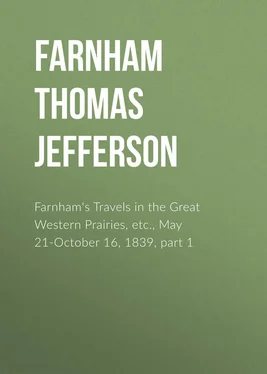Thomas Farnham - Farnham's Travels in the Great Western Prairies, etc., May 21-October 16, 1839, part 1
Здесь есть возможность читать онлайн «Thomas Farnham - Farnham's Travels in the Great Western Prairies, etc., May 21-October 16, 1839, part 1» — ознакомительный отрывок электронной книги совершенно бесплатно, а после прочтения отрывка купить полную версию. В некоторых случаях можно слушать аудио, скачать через торрент в формате fb2 и присутствует краткое содержание. Издательство: Иностранный паблик, Жанр: foreign_antique, foreign_prose, Путешествия и география, на английском языке. Описание произведения, (предисловие) а так же отзывы посетителей доступны на портале библиотеки ЛибКат.
- Название:Farnham's Travels in the Great Western Prairies, etc., May 21-October 16, 1839, part 1
- Автор:
- Издательство:Иностранный паблик
- Жанр:
- Год:неизвестен
- ISBN:нет данных
- Рейтинг книги:3 / 5. Голосов: 1
-
Избранное:Добавить в избранное
- Отзывы:
-
Ваша оценка:
- 60
- 1
- 2
- 3
- 4
- 5
Farnham's Travels in the Great Western Prairies, etc., May 21-October 16, 1839, part 1: краткое содержание, описание и аннотация
Предлагаем к чтению аннотацию, описание, краткое содержание или предисловие (зависит от того, что написал сам автор книги «Farnham's Travels in the Great Western Prairies, etc., May 21-October 16, 1839, part 1»). Если вы не нашли необходимую информацию о книге — напишите в комментариях, мы постараемся отыскать её.
Farnham's Travels in the Great Western Prairies, etc., May 21-October 16, 1839, part 1 — читать онлайн ознакомительный отрывок
Ниже представлен текст книги, разбитый по страницам. Система сохранения места последней прочитанной страницы, позволяет с удобством читать онлайн бесплатно книгу «Farnham's Travels in the Great Western Prairies, etc., May 21-October 16, 1839, part 1», без необходимости каждый раз заново искать на чём Вы остановились. Поставьте закладку, и сможете в любой момент перейти на страницу, на которой закончили чтение.
Интервал:
Закладка:
England can show no discoveries between these latitudes so important as these; and consequently has not equal rights with the {xx} Americans as a discoverer, to that part of Oregon north of the 49th degree of latitude. We also discovered the Columbia River; 21 21 Referring to the second voyage of Captain Robert Gray. See our volume vi, p. 183, note 1. – Ed.
and its whole valley, in virtue of that discovery, accrues to us under the laws of nations. One of these laws is that the nation which discovers the mouth of a river, by implication discovers the whole country watered by it. We discovered the mouth of the Columbia and most of its branches; and that valley is ours against the world – ours, also, by purchase from Spain, the first discoverer and occupant of the coast – ours by prior occupancy of its great river and valley, and by that law which gives us, in virtue of such discovery and occupancy, the territories naturally dependent upon such valley. 22 22 The prior occupancy was the settlement at Astoria, for which see prefaces to Franchère's Narrative , in our volume vi, and Ross's Oregon Settlers in our volume vii. After the close of the War of 1812-15, the United States made application in accordance with the Treaty of Ghent for the restoration of Astoria, which accordingly was formally transferred, October 6, 1818, to Commissioner J. H. Prevost and Captain J. Biddle. No use was made, however, of this sovereignty, the treaty of joint occupancy being signed October 20, of the same year. – Ed.
We are the rightful and sole owner of all those parts of Oregon, which are not watered by the Columbia, lying on its northern and southern border, and which, in the language of the law, are naturally dependent upon it. Oregon territory, for all these reasons is the rightful property of the United States.
CHAPTER I
The Rendezvous – The Destination – The Education of Mules – The Santa Fé Traders – The Mormons – The Holy War – Entrance upon the Indian Territory – A Scene – An Encampment – A Loss – A Hunt – The Osage River – A Meeting and Parting – Kauzaus Indians – An Indian Encampment – Council Grove – Ruins – An Indian and his Wants – Elk – A Tempest – Captain Kelly – A comfortless Night.
On the 21st of May, 1839, the author and sixteen others arrived in the town of Independence, Missouri. 23 23 For a sketch of Independence see Gregg's Commerce of the Prairies , in our volume xix, p. 189, note 34. – Ed.
Our destination was the Oregon Territory. Some of our number sought health in the wilderness – others sought the wilderness for its own sake – and others sought a residence among the ancient forests and lofty heights of the valley of the Columbia; and each actuated by his own peculiar reasons, or interest, began his preparations for leaving the frontier. 24 24 When Jason Lee, the Methodist missionary, went east (1838-39) for re-inforcements, he took with him two Indian youths to be educated. Meetings were held in many cities; at Peoria, Illinois, one of the lads being taken ill, was left behind. His presence continued the interest aroused by Lee's representations, so that early in 1839 a company of young men, not one of whom had ever been west of St. Louis, was organized to undertake the Oregon migration. The party consisted at first of nineteen persons. See Robert Shortess, "First Emigrants to Oregon," in Oregon Pioneer Association Transactions , 1896. – Ed.
Pack mules and horses and pack-saddles were purchased and prepared for service. Bacon and flour, salt and pepper, sufficient for four hundred miles, were secured in sacks; our powder-casks were wrapt in painted canvas, and large oil-cloths were purchased to protect these and our sacks of clothing from the rains; our arms were thoroughly repaired; bullets were moulded; powder-horns and cap-boxes filled; and all else done that was deemed needful, before we struck our tent for the Indian territory.
But before leaving this little woodland town, it will be interesting to remember that it is the usual place of rendezvous and "outfit" for the overland traders to Santa Fé and other Mexican states. In the month of May of each year, these traders congregate here, and buy large Pennsylvania waggons, and teams of mules to convey their calicoes, cottons, cloths, boots, shoes, etc. over the plains to that distant and hazardous market. It is quite amusing to greenhorns, as those are called who have never been engaged in the trade, to see the mules make their first attempt at practical pulling. They are harnessed in a team, two upon the shaft, and the remainder two abreast in long swinging iron traces; and then, by way of initiatory intimation that they have passed from a life of monotonous contemplation, in the seclusion of their nursery pastures, to the bustling duties of the "Santa Fé trade," a hot iron is applied to the thigh or shoulder of each, with an embrace so cordially warm, as to leave there, in blistered perfection, the initials of their last owner's name. This done, a Mexican Spaniard, as chief muleteer, mounts the right-hand wheel mule, and another, the left hand one of the span next the leaders, while four or five others, as foot-guard, stand on either side, armed with whips and thongs. The team is straightened – and now comes the trial of passive obedience. The chief muleteer gives the shout of march, and drives his long spurs into the sides of the animal that bears him; his companion before follows his example; but there is no movement. A leer – an unearthly bray, is the only response of these martyrs to human supremacy. Again the team is straightened, again the rowel is applied, the body-guard on foot raise the shout, and all apply the lash at the same moment. The untutored animals kick and leap, rear and plunge, and fall in their harness. In fine, they act the mule, and generally succeed in breaking neck or limb of some one of their number, and in raising a tumult that would do credit to any order of animals accustomed to long ears.
After a few trainings, however, of this description, they move off in fine style. And, although some luckless animal may at intervals brace himself up to an uncompromising resistance of such encroachment upon his freedom, still, the majority preferring passive obedience to active pelting, drag him onward, till, like themselves, he submits to the discipline of the traces.
'Independence' was the first location of the Mormons west of the Mississippi. Here they laid out grounds for their temple, built the 'Lord's store,' and in other ways prepared the place for the permanent establishment of their community. But, becoming obnoxious to their neighbours, they crossed the Missouri, and founded the town of 'Far West.' In 1838 they recommenced certain practices of their faith in their new abode, and were ejected from the state by its military forces. 25 25 For the Mormons in Missouri consult our volume xx, pp. 93-99, with accompanying notes. – Ed.
The misfortunes of these people seem to have arisen from proceeding upon certain rules of action peculiar to themselves. The basis of these rules is the assumption that they are the "Saints of the Most High," to whom the Lord promised of old the inheritance of the earth; and that as such they have the right to take possession of whatever they may be inspired to desire. Any means are justifiable, in their belief, to bring about the restoration to the "Children of God" of that which He has bequeathed to them. In obedience to these rules of action, any Mormon or "Latter-Day Saint" labouring for hire on a "worldly" man's plantation, claimed the right to direct what improvements should be made on the premises; what trees should be felled, and what grounds should, from time to time, be cultivated. If this prerogative of saintship were questioned by the warm-blooded Missourians, they were with great coolness and gravity informed that their godly servants expected in a short time to be in comfortable possession of their employers' premises; for that the Latter-Days had come, and with them the Saints; that wars and carnage were to be expected; and that the Latter-Day Prophet had learned, in his communications with the Court of Heaven, that the Missourians were to be exterminated on the first enlargement of the borders of "Zion;" and that over the graves of those "enemies of all righteousness" would spring that vast spiritual temple which was "to fill the earth."
Читать дальшеИнтервал:
Закладка:
Похожие книги на «Farnham's Travels in the Great Western Prairies, etc., May 21-October 16, 1839, part 1»
Представляем Вашему вниманию похожие книги на «Farnham's Travels in the Great Western Prairies, etc., May 21-October 16, 1839, part 1» списком для выбора. Мы отобрали схожую по названию и смыслу литературу в надежде предоставить читателям больше вариантов отыскать новые, интересные, ещё непрочитанные произведения.
Обсуждение, отзывы о книге «Farnham's Travels in the Great Western Prairies, etc., May 21-October 16, 1839, part 1» и просто собственные мнения читателей. Оставьте ваши комментарии, напишите, что Вы думаете о произведении, его смысле или главных героях. Укажите что конкретно понравилось, а что нет, и почему Вы так считаете.












